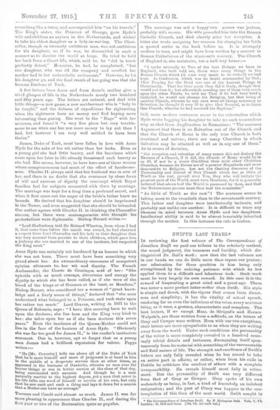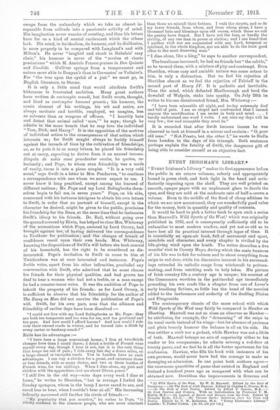SWIFT'S LAST YEARS.* IN reviewing the first volume of The
Correspondence If Jonathan Swaft we paid our tribute to the scholarly method, the sound judgment, the terseness and lucidity, which dis- tinguished Ball's work : now that the last volumes are in our bauds we can do little more than repeat our praises; our admiration for these qualities in him being only strengthened by the untiring patience with which he bas applied them to a diffiunit and laborious task. Such work must be very largely its own reward. In this case it is the reward of frequenting a great mind and a great age. There was never a more perfect letter-writer than swift. His style is simple and direct, with the vigour that conies from direct- ness and simplicity; it has the vitality of actual speech, rendering for us even the inflexions of the voice, every sentence being, as it were, a gesture, cheracteriatie and complete. The best letters, if we except Mine. de Sevigne's and Horace Walpole's, are those written from a solitude, as the letters of Gray and Cowper were written. Even with our two exceptions, their letters are more sympathetic to us when they are writing away from the world. Under such conditions the personality of the writer is more completely revealed in a hundred seem- ingly trivial details and instances, disengaging itself spoil. tanecusly from its material with something of the unreasonable and fluid nature of life. The strength and excellence of Swift's letters are only fully revealed when he has ceased to take an active part in affairs; or rather, when from his exile in Dublin he criticizes the conduct of others with a complete irresponsibility. He reveals himself most fully in retire- ment. But the personality of Swift was very different from that of Gray or Cowper. Gray spoke of his own melancholy as being, in fact, a kind of faucet/to/v. an indolent resignation; and the poet of Olney was happier in the con- templation of this than of the next world. Swift sought to
• The Corragmationce of /mica= Swift. By P. Ellington BAIL Vols. VA% London; U. Boll and bons. [lea. lid. net each veld escape from the melancholy which we take as almost in- separable from solitude into a passionate activity of mind. His imagination never wearies of creating, and thus his letters have for us a kind of mental excitement which the others lack. His mind, in its idealism, its humour, and its disillusion, is more properly to be compared with Langland's and with Milton's. He never " laughed and shook in Rabelais easy
chair," his humour is never of the " sereine et ignite pessimisme " which lit Anatole France praises in Don Quixote and Candide. ° Gulliver springs from a temperament and nature more akin to Bunyan's than to Cervantes' or Voltaire's. For " the tear upon the eyelid of a jest " we must go, in English literature, to Sterne.
It is only a little mind that would attribute Swift's bitterness to frustrated ambition. Many great authors have written de contemptu, noundi, but Swift wrote, thought, and lived as contemptor huntani genera's; his humour, the comic element of his writings, his wit and satire, are always sardonic and terrible, employed, we imagine, less as solvents than as weapons of offence. " I heartily hate
and detest that animal called man," ho says ; though he admits in the same breath that he may love the individual " Tom, Dick, and Harry." It is the opposition of the motives of individual action to the consequences of that action which interests us ; for Swift sought always to fortify himself against the inroads of time by the cultivation of friendships,
or, as he puts it in so many letters, he placed his friendship out at usury, expecting to derive from it an annual income. Singula de noble anal praedantur euntee, he quotes, re- luctantly; and Pope, to whom even friendship was a mode of vanity, turns it into a pious couplet. " It is a very cold scent," says S wift in a letter to Mrs. Pendarves, "to continue a correspondence with one whom we never expect to see. I never knew it long practised, except among the learned of different nations ; Mr. Pope and my Lord Bolingbroke them- selves begin to fail me, in seven years," Pope, on his side, concerned with his tortuous intrigues to obtain his own lettere to Swift, in order that no portrait of himself, except in the character he desired, might be given to the public, proclaims his friendship for the Dean, at the same time that he insinuates Swift's idiocy to his friends. Dr. Ball, without going over the ground covered by Elwin, has helped to clear Mrs. Whiteway of the accusations which Pope, assisted by Lord Orrery, had brought against her, of having delivered the correspondence to Faulkner for publication ; and the charges of breach of confidence recoil upon their own heads. Mrs. Whiteway, knowing the dispositions of Swift's will before she took control of his household, has the right to be considered as dis- interested. Pope's invitation to Swift to come to him at Twickenham was at once interested and insincere. Pope's feeble voice, apart from his other infirmities, precluded any conversation with Swift, who admitted that he must choose his friends for their physical qualities, and had grown too deaf to hear a woman who had not a treble, or a man except he had a counter-tenor voice. It was the ambition of Pope to inherit the property of his friends: as for Lord Orrery, it is sufficient to observe that his friendship for the author of The Essay on Man did not survive the publication of Pope's will. Swift, for his own part, sees that the alliance and friendship of earlier days have been dissolved :— "I could not live with my Lord Bolingbroke or Mr. Pope : they aro both too temperate and too wise for me, and too profound and too poor. And how could I afford horses P And how could I ride over their cursed roads in winter, and be turned into a ditch by every carter or hackney-coach ? "
Exile has its advantages :— " I have here a large convenient house ; I live at two-thirds cheaper here than I could there; I drink a bottle of French wine myself every day, though I love it not, but it is the only thing that keeps me out of pain ; I ride every fair day a dozen miles, on a large strand or turnpike roads. You in London have no such advantages. I can buy a chicken for a groat, and entertain three or four friends, with as many dishes, and two or three bottles of French wine, for ten shillings. When I dine alone, my ,pint and chicken with the appendixes cost me about fifteen pence.'
" I still live in the old way—nine days every week I dine at home," he writes to Sheridan, " but in revenge I forbid the Sunday spongers, whom in the lump I never cared to see, and cared less to hear, when I couldn't hear at all." His increasing infirmity narrowed still further his circle of friends:— " My popularity that you mention," he writes to Pope, "is wholly confined to the common people, who are more constant than those we miscall their betters. I walk the streets, and so do my lower friends, from whom, and from whom alone, I have a thousand hats and blessings upon old scores, which those we call the gentry have forgot. But I have not the love, or hardly the civility, of any one man in power or station; and I can boast that I neither visit nor am acquainted with any Lord, temporal or spiritual, in the whole kingdom, nor am able to do the least good office to the most deserving man."
"I dine alone, like a king," he says to another correspondent.
The loneliness increased; he bad no friends but " the rabble," as he termed them, with a mixture of pity and contempt. Even Sheridan, whose easy and amiable nature was some solace to him, is only a distraction. But we feel his rejection of Sheridan almost as we feel the rejection of Falstaff in the second part of Henry IV. It is pathetic and inevitable. Then the mind, which defeated Marlborough and bred the downfall of Walpole, sinks into apathy. On July 26th he writes to his one disinterested friend, Mrs. Whiteway "I have been miserable all night, and to-day extremely deaf and full of pain. I am so stupid and confounded that I cannot express the mortification I am under in body and mind. . . . I hardly understand one word I write. I am sure my days will be very few ; few and miserable they must be."
It is recorded that after Swift became insane he was observed to look at himself in a mirror and exclaim " 0, poor old man." "Not Presto, but the other I," he wrote to Stella, from London in the days of his triumph. Both sentences perhaps explain the fatality of Swift, the dangerous gift of
being able to consider oneself as an objective fact.







































 Previous page
Previous page